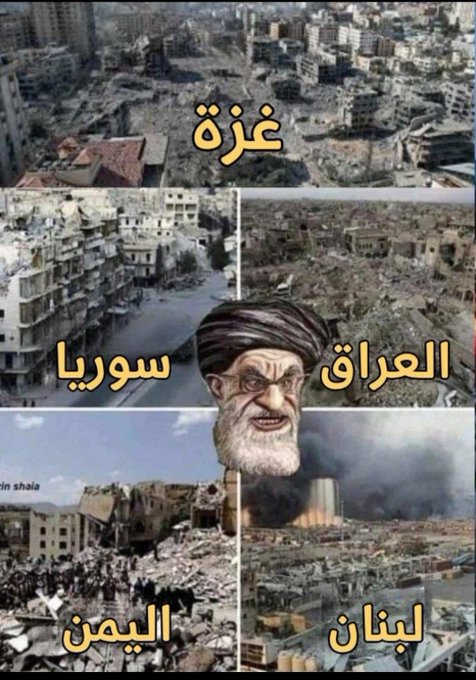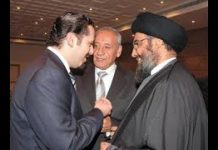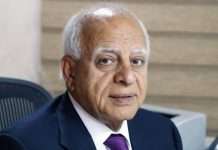Iran Is its Own Worst Enemy
Tariq Al-Homayed/Asharq Al-Awsat newspaper/April 17/2024
إيران أكبر عدو لنفسها
طارق الحميد/الشرق الأوسط/17 نيسان/2024
ارتكب النظام الإيراني برده الهزلي على إسرائيل خطأ استراتيجياً مكلفاً لا يمكن معالجته بسهولة، أو قريباً؛ حيث أطلقت طهران نحو الثلاثمائة مسيّرة، وبعضاً من الصواريخ، ومن دون وقوع ضرر يذكر. خطأ إيران الاستراتيجي أنها حرصت على حماية صورتها الدعائية أكثر من منافعها السياسية، وبالتالي سددت لنفسها ضربة لم يستطع الخصوم تسديدها لها منذ الثورة الخمينية، وحتى لحظة الرد الإيراني الهزلي الأخير. الرد الإيراني على قتل إسرائيل نائب «فيلق القدس»، وخمسة آخرين، في القنصلية الإيرانية بدمشق، أثبت للعالم أن إيران دولة شريرة لا يمكن الوثوق بها، وقبل حصولها على السلاح النووي، فكيف إذا حصلت عليه؟! وما أثبت ذلك هو النظام نفسه وليس الخصوم. ما فعلته طهران كان تهوراً، وضد كل ما كان يروج عن الصبر الاستراتيجي، ونسج السجاد، الذي يعني أن بمقدور السياسي الإيراني الصبر سنوات، وعدم استعجال النتائج، بل إن الرد الهزيل أظهر أن درجة القلق الإيرانية مرتفعة، رغم ارتفاع معدل سن صناع القرار هناك. وتهور المسن خطر، سياسياً، وقيل: «احذر من المسن الذي في عجلة من أمره»، وسياسياً يعني ذلك أن المسن لم يعد يثق بالمؤسسات والمشروع، ويريد سرعة الإنجاز وتلميع صورة النظام على حساب الأهداف الاستراتيجية.
إيران أثبتت أنها دولة مشاغبة وعدوة لنفسها، ومن دون جهد يذكر من إسرائيل ودول المنطقة، وأسقطت حجج كل المدافعين عنها في الغرب، وتحديداً في الولايات المتحدة، وهو ما يعرف باللوبي الإيراني، وباتت على أجندة الانتخابات الرئاسية الأميركية بشكل حقيقي. وها هو ذا الكونغرس الأميركي ينتفض لحماية إسرائيل التي رفعت عنها إيران، بردها الهزلي، الحرج حول الحرب في غزة، التي لم تعد موضوع الساعة، ولا الموضوع الأساس، وذكّرت إيران بنفسها أنها الخطر الحقيقي بالمنطقة، على السلام والاستقرار. إيران، وبردها الهزلي، أثبتت أن الدفاع المشترك في المنطقة قابل للتنفيذ، وحتمي، ويكفي التذكير أن جلّ المسيّرات والصواريخ التي أطلقتها إيران على إسرائيل تم التصدي لتسعة وتسعين في المائة منها، وجلها خارج إسرائيل، وبعضها في العراق، منطقة النفوذ الإيراني! ورد إيران الهزلي ذكّر كل المنطقة بأنها دولة لا يمكن الوثوق بها وهي غير نووية، فكيف سيكون الحال مع إيران النووية؟ والقصة لا تقف عند دول المنطقة فقط، أو الغرب والولايات المتحدة. الصين الآن تدعو لضبط النفس، ومثلها الروس، لأنه لا طرف دولي يتحمل تعطيل الملاحة البحرية، وإشعال حرب ضخمة في الشرق الأوسط وبأسلحة بدائية، وعقلية سياسية عاجزة عن فهم العواقب. كما ارتكبت إيران أيضاً خطأ استراتيجياً، حين اتضح أن ردها الهزلي كان بسبب مقتل نائب «فيلق القدس»، وليس دفاعاً عن غزة، أو «حماس»، ما يقول لأبناء المنطقة إن الإيراني أهم بالنسبة لطهران من القضية الفلسطينية. كل ما سبق يقول لنا إن إيران ارتكبت خطأ استراتيجياً ما قبله شيء، وما بعده شيء آخر، وعواقبه كبيرة جداً، حيث ذكّر المنطقة بضرورة السعي لإنجاز السلام، واتفاقيات الدفاع، وأن «إيران نووية» هو خطأ قاتل سيدفع العالم أجمع ثمن القبول به.
Iran Is its Own Worst Enemy
Tariq Al-Homayed/Asharq Al-Awsat newspaper/April 17/2024
The Iranian regime’s comical retaliation against Israel was a costly strategic mistake that cannot be easily or quickly corrected. Tehran launched about 300 drones and a few missiles without inflicting significant damage. Its strategic mistake was to focus more on safeguarding its image than its political interests, thereby dealing itself a blow that none of its adversaries had managed to land since the Khomeini revolution. Iran’s retaliation to Israel’s attacks on its consulate in Damascus, which led to the deaths of the Quds Force’s deputy commander and five others, showed the world that Iran is a malevolent actor that should not be trusted, even without nuclear weapons, let alone if it does! The regime affirmed this itself, not its adversaries. What Tehran did was reckless. It went against all the talk of strategic patience and carpet weaving, which promoted a narrative that Iranian politicians could remain patient for years and fight the urge to achieve swift results. Indeed, the feeble response showed that, despite the fact that the median age of its decision-makers is high, the Iranians are extremely anxious.
The recklessness of the elderly is politically dangerous. “Beware of the old man in a hurry,” as the saying goes. Politically, it means that the senior leader no longer trusts his country’s institutions and its project, and that he seeks swift results and is willing to polish the regime’s image at the expense of strategic goals.
Iran has proven that it is a seditious state, and that it is its own enemy, without much help from Israel and the countries of the region. It has undercut the arguments of everyone who defends it in the West, specifically in the United States, where what is known as the Iranian lobby has become an item on the agenda of the presidential elections.
Congress is now rallying around the protection of Israel. With its comical response, Iran has relieved the tensions around the war in Gaza, which is no longer the priority. Iran reminded Congress that it is a real threat to peace and stability in the region. Iran’s comical response has proven that joint defense in the region is practical and inevitable. We need to go no further than reminding ourselves that 99 percent of the drones and missiles Iran launched at Israel were intercepted, mostly outside Israel; some were even intercepted in Iraq, which is part of Iran’s sphere of influence! Iran’s comical response reminded everyone in the region that it cannot be trusted, even without nuclear weapons. How would it be perceived if it were to acquire them? Its nuclear program does not only concern regional countries, or the West and the United States. China is now calling for restraint, and so are the Russians. No global actor can afford to see maritime navigation disrupted or the instigation of a massive conflict by a country with primitive weapons whose political mindset prevents it from understanding the consequences of its actions.
Iran also made a strategic mistake when it became clear that its comical response was retaliation for the assassination of the deputy commander of the Quds Force and not in defense of Gaza or Hamas. That told the people of the region that Iranians are more important to Tehran than the Palestinian cause.
All of that tells us that Iran committed an unprecedented strategic error. What comes next is different, and the mistake will have grave consequences. Iran has reminded the region that we must strive for peace and conclude defense agreements, and it has reaffirmed that allowing Iran to become a nuclear power would be a fatal mistake for which the entire world would pay a price.
**Tariq Al-Homayed: Saudi journalist and writer, and former editor-in-chief of Asharq Al-Awsat newspaper






















